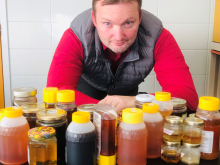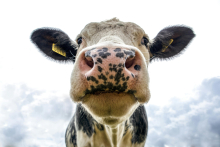While there are plenty of examples to the contrary, the general academic consensus is that boycotts don’t work for a sustained period, as consumers eventually disengage and reprioritize brand loyalties or price. According to a recent poll, however, the Globe and Mail reports that the Buy Canadian movement shows no signs of slowing down.

Royal Brinkman Canada has appointed Mohammed Antar (PhD, P.Ag) as head of its agronomy department, noting in their announcement that he "will play a key role in helping growers enhance crop productivity and quality through innovative, science-based solutions."
Mohammed earned his Ph.D. in Plant Science (Agronomy) from McGill University in 2024. His expertise spans agronomy, microbe-coated fertilizers, nutrient management, sustainable agriculture, and biological products.

The Canadian Council of Academics (CCA) has formed an expert panel to examine how Indigenous science can be supported to advance policy and governance in a way that achieves reciprocal benefits for all people in Canada. Using food sovereignty as a case study, the panel will develop a framework that can be applied across a range of policy issues.

Some items from quintessentially Canadian brands have jumped in price at a Loblaws in Toronto, CBC News reports.
According to CBC's analysis of grocery products labelled as Canadian, while most products remained the same price and about two per cent decreased in price, the regular price of hundreds of products have increased since governments put out the call to buy food made in Canada. Some are from iconic Canadian brands, including Tim Hortons, St-Hubert, Swiss Chalet, and Chapman's.

McGill University researchers have developed an AI-powered method to verify the origin of honey, ensuring that what’s on the label matches what’s in the jar. The breakthrough offers a potential solution to a long-standing problem.
“Honey is one of the most fraud-prone commodities in global trade. It often involves mislabelling where it was produced or the types of flowers that bees collected nectar from,” said lead author Stéphane Bayen, Associate Professor and Chair of McGill’s Department of Food Science and Agricultural Chemistry.

A small town in Quebec's Montérégie region is trying a novel approach to help mitigate the impacts of climate change and accelerate the greening of the community, reports CBC News.
As of 2025, homeowners in Saint-Amable, Que., roughly 40 kilometres east of Montreal, are being charged an annual surtax of $200 if they don't have at least one leafy, deciduous tree in their front yard.

For Assistant Professor Lucienne Tritten at McGill University, parasitic worms represent an urgent challenge and an opportunity to push the boundaries of modern science, DNA to RNA (D2R) McGill writes in a new article. With funding from D2R's Foundational Projects program, Prof. Tritten is developing an innovative approach to combating parasitic infections using the gut bacteria we already have inside us.

US President Donald Trump says Canada has been imposing sky-high tariffs on imported American dairy products. Agronomist and economist Pascal Thériault, Director of the Farm Management and Technology Program at McGill, spoke to CBC and Global News to give key context on this issue in their reporting:

In a recent article, La Presse investigates whether boycotting American products could improve our health. Experts interviewed for the article said it's possible—but only if we change other eating habits in the process.

On March 27, McGill honoured 141 laureates at the 20th annual Bravo Gala, celebrating researchers who received prestigious provincial, national or international awards in 2024, including eight researchers in the Faculty of Agricultural and Environmental Sciences.
In his opening remarks, McGill President and Vice-Chancellor, Deep Saini, applauded the honourees for their efforts, underlining the importance of McGill’s research contributions.

Quebec supermarket chains say boycotts of American products are having a direct impact on US food sales, TVA reports.
Grocery stores have put new measures in place to indicate the origin of their products. Loblaw recently announced they will be adding a logo to identify products subject to customs tariffs.

An orange tinted snowy owl in Michigan has baffled scientists with its orange colouring, CBC News reports. Experts say it could be a genetic mutation, an accident, or human mischief.
Ornithologist and Professor Emeritus at McGill, David Bird, expressed some doubts about the strange colouration being caused by genetics.
Please join us in congratulating the 2025 winners of the Macdonald Campus Gold Key Awards, selected for their outstanding contributions, passion, and commitment to enriching student life on our campus. Read their stories below.

The presence and concentration of PFAS, also known as "forever chemicals," in fertilizing residual materials will be monitored under new standards in Quebec through a management code, according to Quebec's Environment Ministry.
Quebec's code on the management of fertilizing residual materials such as sewage sludge, also known as biosolids—which come from treating municipal or industrial wastewater—will take effect Nov. 1.
The code takes into account a total of 13 types of substances and includes monitoring guidelines.

In a recent article, CBC News spoke to several experts who say U.S. tariffs on Canadian dairy products would have little effect on Canada's protectionist system.
The director of McGill University's Farm Management and Technology Program agrees that these tariffs would have a "somewhat limited" impact on industry.
